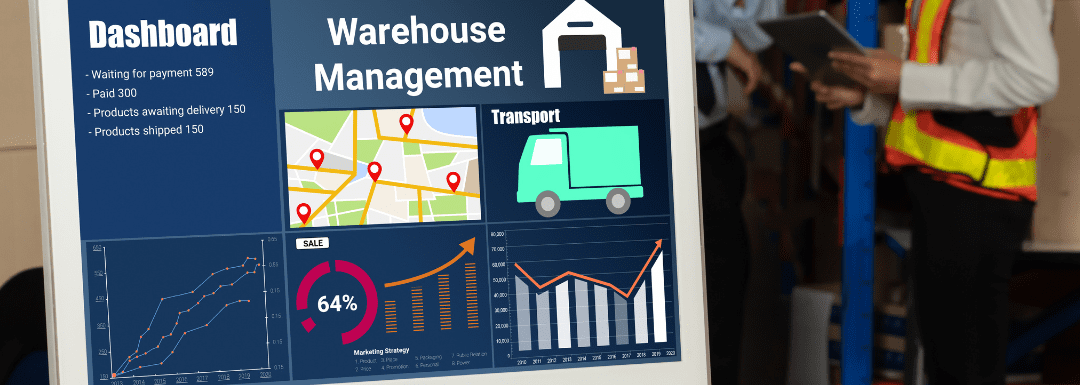In today’s fast-paced and competitive business environment, the efficiency of warehouse operations can make or break your supply chain. A well-integrated warehouse management system (WMS) is the cornerstone of operational excellence, ensuring all aspects of the supply chain work in harmony. In this blog post, we will discuss WMS integration capabilities and how they can transform your warehouse operations.
The role of WMS in modern warehousing
A warehouse management system (WMS) is a software solution designed to optimise warehouse operations through inventory management, product tracking, and automation of various warehouse processes. However, the real power of a WMS lies in its ability to integrate with other systems to create a seamless flow of information and enable real-time decision making.
Key Integration Features of WMS
ERP Integration:
Connecting your WMS to your Enterprise Resource Planning (ERP) system is fundamental to synchronise data between all business functions, including finance, sales, and inventory management.
Benefits:
- Uniform Data Management – ensure all departments have access to consistent, up-to-date information.
- Improved Visibility – real-time insight into inventory levels, order status, and financial data.
- Optimised Processes – automate data transfer, reduce manual entry errors, and improve efficiency.
TMS integration:
Integration with transportation management systems (TMS) facilitates efficient coordination between warehouse operations and logistics.
Benefits:
- Optimised Shipping – plan and execute transportation more effectively and reduce costs.
- Improved tracking – monitor product movement in real-time and improve supply chain visibility.
- Efficient dock management – coordinate incoming and outgoing shipments to reduce wait times and improve fulfilment.
E-commerce platform integration:
Automate the connection between your WMS and e-commerce platforms (Shopify, Magento, WooCommerce, etc.) to ensure seamless order processing.
Benefits
- Automatic Order Management – import orders directly from your e-commerce platform and reduce processing time.
- Accurate inventory updates – synchronize inventory levels in real time to avoid out-of-stocks and overselling.
- Improved customer experience – faster order fulfilment increases customer satisfaction and loyalty.
Barcode and RFID technology integration:
Utilises barcode scanner and RFID technology to improve inventory tracking and accuracy.
Benefits
- Real-time data collection – inventory data is automatically updated as items are moved or scanned.
- Improved accuracy – reduce manual entry errors and ensure accurate inventory counts.
- Efficiency – automated data entry speeds up the picking, packing, and shipping process.
Material handling equipment integration
Connect the WMS to material handling equipment such as conveyors, automated guided vehicles (AGVs), and robotic systems.
Benefits:
- Automation – automated systems reduce manual work and increase throughput.
- Safety – improve workplace safety by minimising contact between humans and heavy equipment.
- Scalability – easily scale your operations to meet growing needs without significantly increasing labour costs.
Business Intelligence and Reporting Tools Integration:
Integrates with reporting and analytical tools to provide deeper insight into warehouse performance.
Benefits:
- Data-driven decisions – leverage comprehensive data to make informed strategic decisions.
- Performance Monitoring – track key performance indicators (KPIs) and identify areas for improvement.
- Predictive Analytics – anticipate trends and proactively optimize operations.
WMS Integration Best Practices
Define clear goals:
Decide what you want to achieve with your WMS integration. E.g. Greater accuracy, faster order fulfilment, or better inventory control?
Select a compatible system:
Ensure that the WMS and other systems (ERP, TMS, etc.) are compatible and allow smooth data exchange.
Invest in training:
Thoroughly train your team to effectively use the integrated system.
Monitoring and Optimisation:
Continuously monitor the performance of integrated systems and make necessary adjustments to improve efficiency.
Integrating your warehouse management system with other key business systems isn’t just a technology upgrade, it’s a strategic move that will revolutionise your operations. WMS integration enables seamless data flow and real-time decision-making, increasing transparency, accuracy, and efficiency across the supply chain. Harness the power of integration to unlock the full potential of your warehouse operations and drive your business forward.
Are you worried that a warehouse management solution will be too expensive, or that you will be trapped in a long contract? To arrange a demo or discuss your requirements, give THINK a call on 0330 350 0715, email enquiries@tkinv.com or complete the Quick Quote form below. We can work with your business to help save you money and drive down costs.


Recent Comments